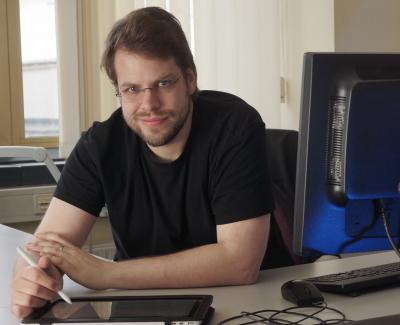Jan 18 2013
(Jena) The planet Earth will die – if not before, then when the Sun collapses. This is going to happen in approximately seven billion years. In the universe however the death of suns and planets is an everyday occurance and our solar system partly consists of their remnants.
 PD Dr. Axel Maas and colleagues from the Universities of Jena and Darmstadt (both Germany) have succeeded in simulating the strong atomic nuclear interactions to enable its calculability while at the same time preserving the typical characteristics of a neutron star. Credit: Photo: Jan-Peter Kasper/FSU
PD Dr. Axel Maas and colleagues from the Universities of Jena and Darmstadt (both Germany) have succeeded in simulating the strong atomic nuclear interactions to enable its calculability while at the same time preserving the typical characteristics of a neutron star. Credit: Photo: Jan-Peter Kasper/FSU
The end of stars – suns – rich in mass is often a neutron star. These "stars' liches" demonstrate a high density, in which atoms are extremely compressed. Such neutron stars are no bigger than a small town, but heavier than our sun, as physicist PD Dr. Axel Maas of the Jena University (Germany) points out. He adds: "The atomic nuclei are very densely packed." Compared to atoms, like water, the nuclei of neutron stars are as tightly packed as a bus with 1.000 passengers crowded together in comparison to a bus with only the driver on board. In these densely packed atomic nuclei, so-called "nuclear forces" are at work. They keep the neutron star together and are responsible for its "eternal life" – and for the last 35 years the strong nuclear interactions were amongst the greatest challenges of theoretical physics.
Together with colleagues from the Universities of Jena and Darmstadt (both Germany) Axel Maas has succeeded in simulating the strong atomic nuclear interactions to enable its calculability while at the same time preserving the typical characteristics of a neutron star. "It is the first theory for such a tight package," the Jena Physicist says. Previously simulations trying to specify the matter inside of neutron stars collapsed far too much in size and yielded the wrong properties time and again – even on the most powerful computers. "These simulations didn't work because there are too many atomic nuclei," Maas explains the problem, whose solution the world of physics has come closer to due to the calculations of the Jena researchers. To get there, the scientists did so many calculations at the Loewe Center for Science Computing (CSC) in Frankfurt, that it would have taken a single PC approximately 2.500 years to do the same.
"We weren't able to solve the initial problem either," Axel Maas concedes, as algorithms are not (yet) powerful enough. However, the Jena physicist who had been researching this problem since 2007 and his colleagues "reached a new level of quality". They found a "modification of the theory for such a tight package", Maas says. And thus they enabled nuclear material to be simulated. Most characteristics of the neutron star are being preserved with the Jena method, but now they enabled its calculability.
The team accomplished this big step forward by intelligently modifying the nuclear forces and by solving the stacking problem of the atoms. That they were at the same time 'cheating a bit', the physicists freely admit. However, Maas firmly believes: "We found the best possible shortcut". Now they know "what is relevant for the original simulation".
Now this new verifying method is available for numerous questions and theories about neutron stars and very dense atomic nuclei packages. Maas already knows of first groups of scientists who are planning to use the Jena findings to work with them and to carry them further. The scientists involved are already in the process of enlarging the simulation and to verify the results: the results enabling scientists to understand the inside of neutron stars eventually.